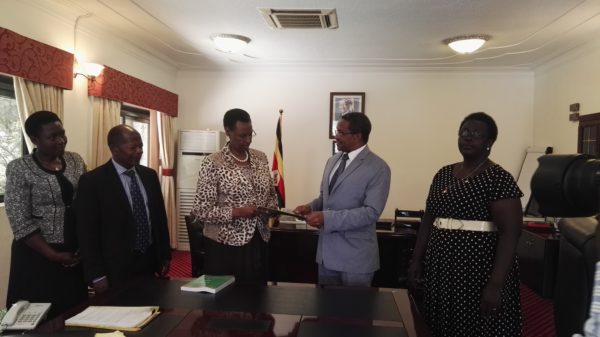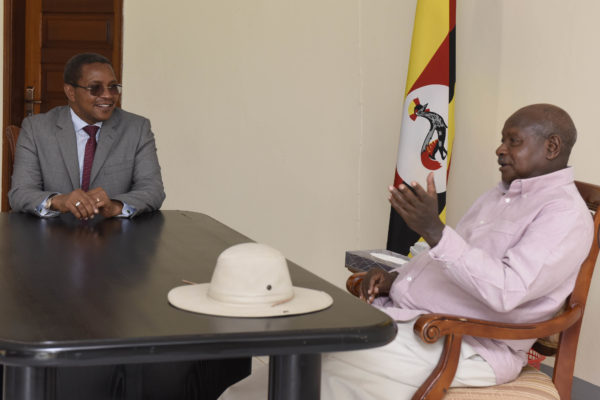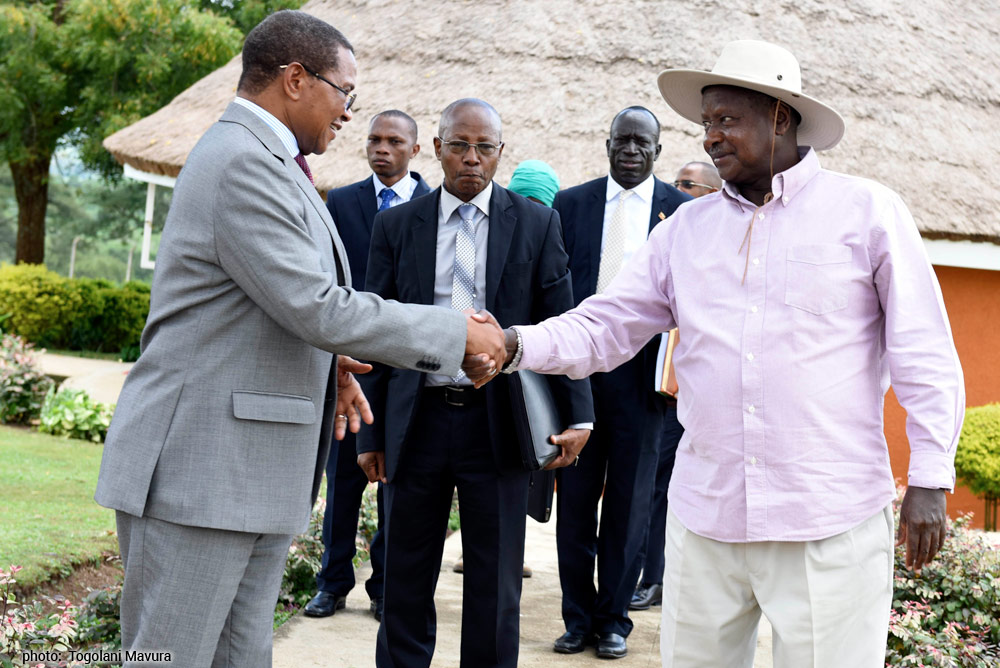His Excellency Jakaya Mrisho Kikwete, the former President of Tanzania and member of the International Commission on Financing Global Education Opportunity (The Education Commission), has concluded a very successful two-day visit to Uganda on behalf of the Commission. On Sunday 6 November, he held exploratory discussions with His Excellency President Yoweri Museveni on how Uganda can be a champion in leading domestic reform efforts as part of the largest expansion of global education opportunity in history. President Museveni welcomed the report and the excellent work done by the Education Commission. He affirmed Uganda’s readiness to champion the implementation of the recommendations of the Commission because it is in the best interest of his country. President Museveni further said that to him and his government, education is a very high priority agenda.
On Monday, November 7, former President Jakaya Kikwete met with Uganda’s Minister of Education and Sports, Her Excellency Janet Museveni, together with senior officials of her Ministry. The Minister reaffirmed Uganda’s readiness to join the Education Commission’s Pioneer Country Initiative. She committed to undertake requisite preparations and provide the initial momentum for its success.

Former President of Tanzania Jakaya Kikwete (second from right) hands Her Excellency Janet Museveni (third from left), Uganda’s Minister of Education and Sports, the Education Commission report. They are joined by Commissioner Teopista Birungi Mayanja (first from right), the Founder of Uganda National Teachers’ Union (UNATU) and Deputy Director Education Services, Kampala Capital City Authority.
PRESIDENT KIKWETE PRESENTS PRESIDENT MUSEVENI WITH PROPOSAL TO JOIN THE LEARNING GENERATION
The Education Commission released a shocking report last month showing that on current trends by 2030:
- More than 800 million children in low and middle-income countries – half of the world’s 1.6 billion children – will not be able to secure basic secondary-level skills equipping them for the labor market
- Of these 800 million, 228 million children will not even be in school and 400 million will leave school without even the most basic primary level qualifications
The Commission set out a plan under which the 1.3 billion children in low and middle-income countries can in the future attain at minimum the same level of basic skills achieved by children in high-income countries today. The plan was presented to the UN Secretary-General at the UN General Assembly and the Commission is now leading efforts to enact reforms in partnership with countries.
The neglect of education is the biggest challenge countries will face over the next 15 years, according to the Commission report. Lack of investment in education systems is crippling the chances of young people in the global workplace and hindering growth, making it impossible for low and middle-income countries to make the transition to high-income status. Failure to change course could result in a loss of $1.8 trillion for low-income countries alone by 2050 – losing 70% of GDP potential.
The Commission finds that the unequal distribution of opportunities fuels further discontent – eagerly exploited by extremists, especially in the Middle East and North Africa – and is a critical motivating factor for mass migration. Evidence shows that the failure to provide education for young children in conflict countries like Syria propels migration to Europe.
THE LEARNING GENERATION: A PATHWAY TO PROGRESS IS POSSIBLE
The first stage of the Commission’s plan is to have all countries adopting the reforms, learning from the fastest improvers – the 25% of education performers around the world – and adapting the lessons to their own country contexts. Reforms would also take advantage of innovations and opportunities offered by new technologies and public-private partnerships. Every child and young person would be included in these plans. The Commission encourages every country to see education as an investment in the future and raise domestic public spending in low-income countries from 3% of national income today to 5% of national income.
The Commission calls for a compact whereby countries making reforms will benefit from international efforts. For instance, a new consortium of multilateral development banks could raise the commitment to education to 15% of combined budgets. A proposed Multilateral Development Bank (MDB) Investment Mechanism outlined could generate an additional $20 billion annually by 2030 – increasing the number of qualified learners to a level ten times the number today in low-income countries.

His Excellency Jakaya Kikwete (left), former President of Tanzania, speaks with His Excellency Yoweri Museveni (right), the President of Uganda.
PIONEER COUNTRY INITIATIVE BEGINS IN UGANDA
As part of the Pioneer Country Initiative, President Kikwete is spearheading discussions with various country leaders to help make education a higher domestic policy priority, enact reforms for greater effectiveness and efficiency, and increase domestic financing. In return for these commitments, the Commission will work to bridge partnerships with the international community to marshal additional financial and technical support. Countries electing to participate in this effort will be prioritized for consideration for any new investment mechanisms or innovations.
Commenting ahead of this first visit, President Kikwete said: “A bold, unprecedented report such as the Commission’s needs an equally bold implementation plan. That is what the Pioneer Country Initiative offers. And so I now call upon the leaders I will be visiting, as well as those throughout the continent and indeed across the globe, to take action and commit to expanding education financing and implementing the reforms necessary to realize the vision of a Learning Generation.”

